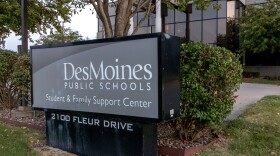After juggling online learning, new classroom challenges, and shifting health guidelines, there was a lot of hope that this school year things would go “back to normal." Unfortunately, things are different, but not in the way many expected.
OnTalk of Iowa, Charity Nebbe spoke with parents, politicians, and health experts about preparing for back to school amid the fourth COVID-19 wave.
What’s the risk?
The delta variant is much more contagious than previous variants and cases of COVID-19 in children are rising. Last week, (Aug. 4-Aug. 11) 4,836 new cases of COVID-19 were reported in Iowa and about 11 percent of those cases were among children under 18. Getting tested for the coronavirus may be more difficult in some places in the state, and, unlike last year, schools will not be able to mandate masks, under a state law passed in May.
“We're seeing children or older adolescents getting critically ill with COVID who have no known pre-existing conditions,” said Dr. William Ching a pediatric hospitalist at Unity Point Health, St. Luke’s Hospital in Cedar Rapids. He has treated some of Iowa's youngest COVID-19 patients. He says that some of the cases of the delta variant in children are serious, citing recent cases in Mississippi and Georgia where children and teenagers have died.
In addition, Ching says that hospitals are seeing an “unprecedented spike” in severe respiratory illnesses that ordinarily occur in the winter months, “namely things such as RSV, croup, viruses such as influenza and such. And these kids are critical and frequently require critical care, including pretty significant respiratory support.”
“We don't know what happens if you have RSV and COVID,” said Ching. “We don't know what happens if you have croup and COVID. We don't know what happens if you have flu. We're starting flu season. We don't know what happens if someone has the flu plus COVID. I, frankly, as a parent, don't want to find out.”
How are schools responding?
As the beginning of the school year draws nearer, concerned parents, teachers and officials are wondering how they may best keep students safe amid the highly contagious variant and new challenges in districts. Some measures have been taken to help mitigate the spread, like updating HVAC systems to improve ventilation in school buildings. But, despite CDC recommendations, schools cannot require masks under state law. On Wednesday one Texas school found a workaround by making masks a part of its dress code. In addition, the number of students who will be attending school in-person, as opposed to online, is higher, meaning there will be limited options for social distancing.
Some schools around Iowa are offering some virtual learning options, though they are more limited than last year.
“A lot of them have just let those [online learning options] go to the wayside. Some schools have expanded and made them permanent,” said IPR’s Grant Gerlock who reports on education in the state. “For instance, Iowa City created a pre-K to 12 online school last year. That's still in place. And it's one of these new state-recognized virtual schools. And that means even students can enroll from outside the district.”
But other places haven’t been able to support full online schooling options. Des Moines Public Schools, Gerlock says, are partnering with an outside company to offer self-paced online options for elementary students. DMPS is offering virtual middle and high school learning options, but as of the Tuesday evening school board meeting, the high school program was full.
Tanya Keith is an Iowa parent and the founder of “Iowans for Universal Masks in Schools.” Last year, her 6-year-old daughter spent much of the school year taking online classes before being diagnosed with dyslexia.
“When we realized that she was facing this learning disability, it became apparent that she really needed the in-person education to fit her needs,” Keith said. “And we felt safe doing that because last year Des Moines public had universal masks in schools, so we sent her to school and she made phenomenal progress.”
The Mask Mandate Ban
Just after midnight on May 20, Gov. Kim Reynolds signed a bill prohibiting mask requirements in schools. Steven Holt, R-Denison, is the author of that legislation and says he stands by it “100 percent,” saying that “the best local control” is not with school boards, but with parents.
“Parents have the right to decide for their children and for themselves whether they think it's appropriate to wear a mask or not,” said Holt. Holt also says there are “countless” studies that show that mask-wearing has a negative psychological impact on children. Holt did not say where these studies could be found or who conducted them, though an editorial published in the Wall Street Journal, written by two physicians, argues that case.
Holt also says that families who are concerned about sending a student to school in-person because of health risks should consider online options. “You want to wear a mask, you want your children to wear a mask, go for it,” said Holt. “If you don’t want to do that, then you shouldn’t be forced to by government. And citizens need to respect the decisions of other people.”
The World Health Organization and CDC have said that, while there is evidence that masks can protect the wearer, the primary reason to wear a mask is to protect those around the wearer.
“We need to have everybody wear masks in order to make it work,” said Tanya Keith. “…online doesn't work for parents who both need to work because you can't leave a first-grader at home to manage an online school program. So what we're talking about here is every kid in school should be wearing a mask to protect all of the kids around them.”
Iowa is not the only state grappling with this issue. Arkansas Gov. Asa Hutchinson has called for a special session to change the law he signed earlier this year, and parents in Florida have filed a lawsuit against Gov. Ron DeSantis challenging his executive order banning school mask mandates. Some school leaders around the country are defying the bans.
Keeping kids healthy
Pediatrician Dr. William Ching encouraged mask wearing among students. “Please, please have your child wear a mask in school as much as possible.”
He also encourages eligible students to get vaccinated against COVID-19. “My recommendation would be, if your child is eligible, please get the vaccine ... the chance that your child will be exposed to COVID, especially when people are not wearing masks, is going to be approaching 100 percent,” he said, adding that there are no known effects on fertility or other long term side effects from the vaccine.
Currently, children under 12 are not eligible for the COVID-19 vaccine. But the shots could be available for younger children as soon as this fall, say researchers studying the vaccine in that age group.
Until then, Ching says to mask up, socially distance, wash hands thoroughly and take other precautions. “Every little bit helps until those children become eligible for vaccination.”
Ching, Gerlock, Keith and Holt made their comments on Talk of Iowa. You can listen to the full conversation here.








